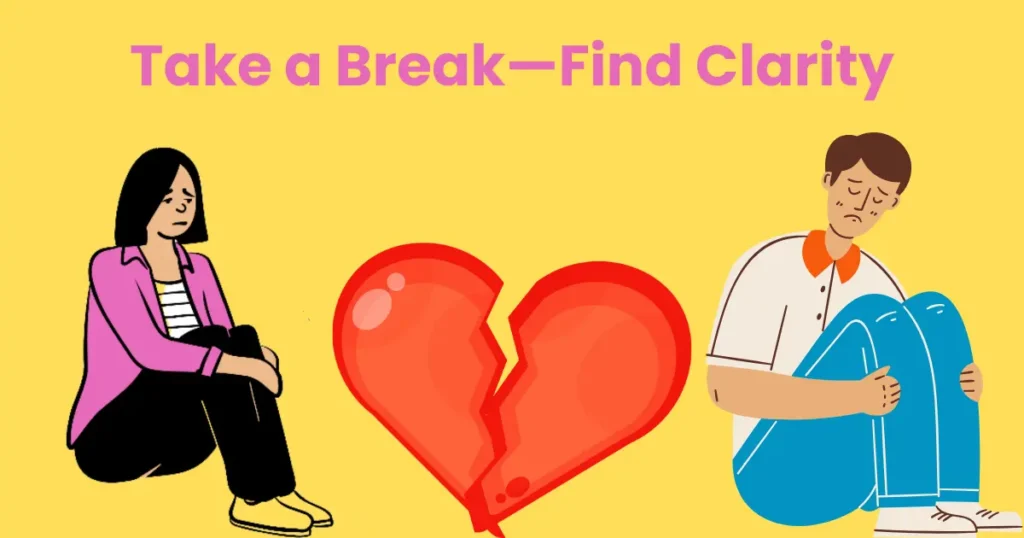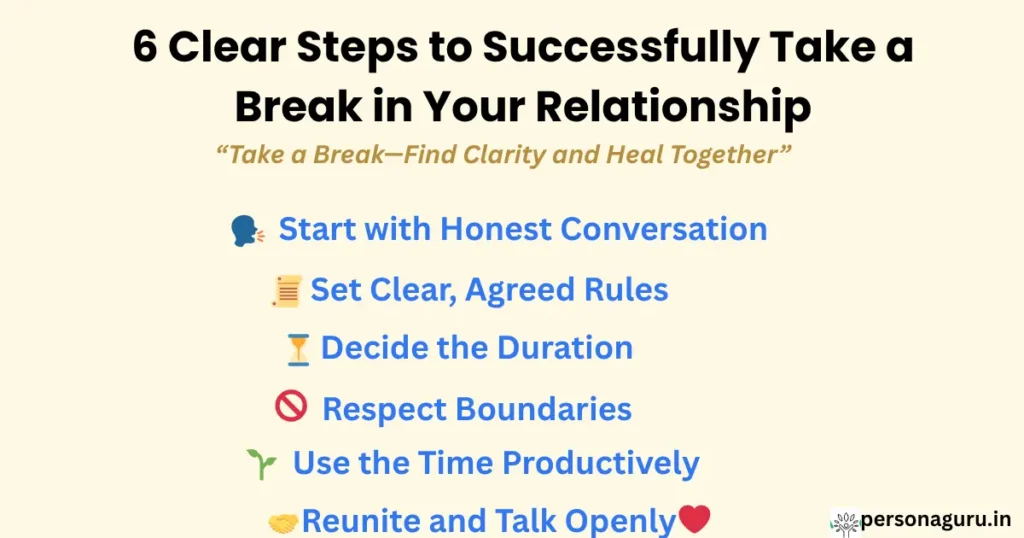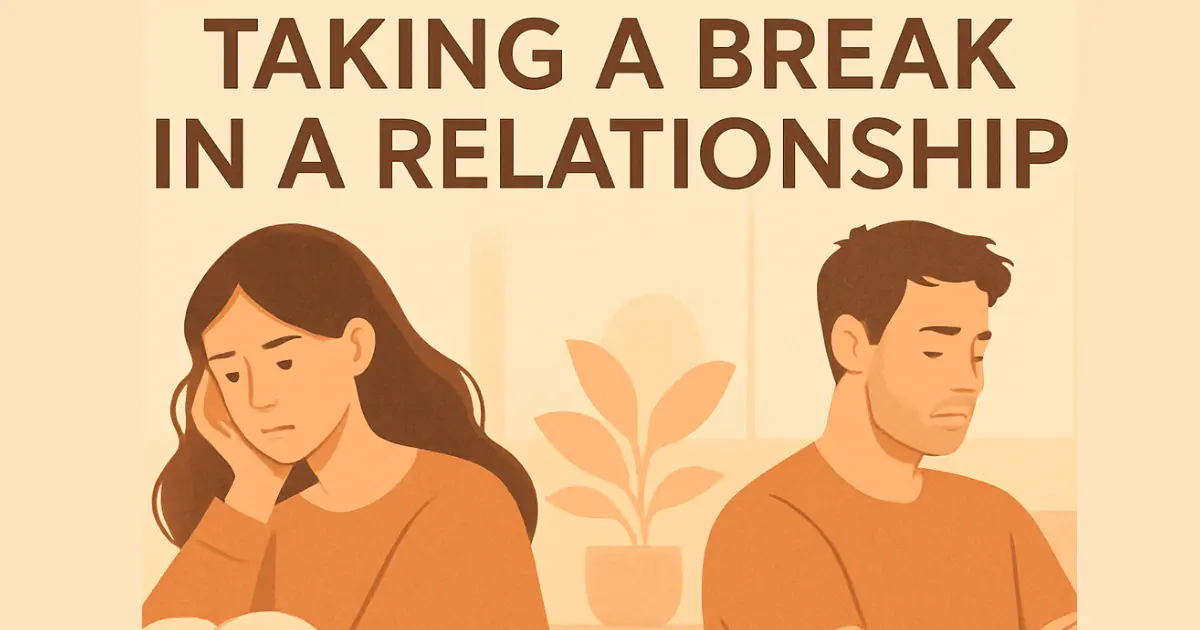Last updated on February 6th, 2026 at 12:44 pm
Are you confused about what taking a break in a relationship really means? Wondering if it’s a sign of a breakup or a chance to fix things? Taking a break can be a healthy way to get space, clear your mind, and decide what’s best for you both.
In this guide, you will find easy answers, clear rules, and smart tips to make a break work—without hurting your relationship. Let’s get started!
Key Takeaways
- Taking a break in a relationship is a mutual, temporary pause—not a breakup.
- When done with honesty, clear rules, and mutual respect, it can help people heal, understand themselves, and solve conflicts.
- Most successful breaks last 2–6 weeks, and should always have clear intentions and boundaries.
- Use the time to improve yourself, reflect, and make wise decisions about the future.
- After the break, honest discussion is key to moving forward—either together or apart.

What Does “Taking a Break” Really Mean in a Relationship?
Taking a break in a relationship means both partners mutually agree to temporarily pause their romantic commitment. It’s not a breakup. Instead, it’s a conscious “time-out” to gain clarity, address personal issues, or decide the future of the relationship without officially ending it.
“Taking a break isn’t about ending things; it’s about gaining clarity, growing individually, and possibly coming back stronger.”
— Dr. Vagdevi Meunier
During a break, couples step back to reflect on their feelings, problems, or life changes—with the intention of coming together later, either to continue the relationship or move on with certainty.
Why Taking a Break Can Be Good for Relationships
Taking a break, when planned thoughtfully, can be powerfully beneficial:
- Mental Health Reset: Stress, anxiety or burnout can harm a relationship. Taking space helps each partner focus on personal well-being.
- Gain Perspective: Apartness provides emotional clarity—helping you see the relationship and your own needs more objectively.
- Reduce Conflict:
Stepping away can cool down ongoing arguments and break negative or repetitive cycles. - Reignite Appreciation:
Sometimes, absence really does make the heart grow fonder. Couples often rediscover what they truly value in each other. - Personal Growth:
Both partners have space to reflect, work on weaknesses, or focus on career and personal goals.
For an expert view on whether breaks really help relationships, check out this detailed article on Verywell Mind.
“Sometimes, the only way to save a relationship is to step away from it for a while.” — Unknown
- A 2024 relationship wellness survey found that almost 30% of couples reported taking at least one break, and nearly half of those couples got back together with stronger communication and better understanding.
- 60% of couples who followed clear break rules and boundaries found the break helpful and reconciled.
Common Reasons for Taking a Break in a Relationship
Couples might choose a break for many practical reasons:
- Repeated Fights or Poor Communication: Conflicts that don’t resolve, even after trying.
- Emotional Exhaustion or Confusion: One or both partners feel drained or unsure about what they want.
- Major Life Changes: Events like moving, new jobs, loss in the family, or finishing school.
- Trust Issues or Infidelity: Lost trust but not ready to completely end things.
- Mental Health or Therapy Needs: Time required to heal, start therapy, or address mental health.
- Feeling “Lost” in the Relationship: One or both people need time to reconnect with their own identity.
Read More: I Just Can’t Trust Anyone I Date: Here’s How to Change That!
How Does Taking a Break in a Relationship Work? (Step-by-Step Checklist)
A successful and healthy break needs structure, honesty, and respect. Here’s a clear action plan to follow:
1. Start with Honest Conversation
Both partners should discuss:
- Why the break is needed.
- What each expects to achieve.
- Whether the goal is clarity, healing, or working out conflict.
2. Set Clear, Agreed Rules
Discuss and agree on:
- Will you be in contact?
- If yes, how often? Only for emergencies? No contact at all?
- Dating Others
- Are you allowed to see or date someone else? (Be completely clear; this is a common source of pain and confusion.)
- Social Media Sharing
- Will you “announce” the break? Is it private? What about sharing photos or posts?
- Support System
- Are you comfortable talking to friends or family about the break?
3. Decide the Duration
- Most breaks last between 2–6 weeks (experts recommend not going beyond 3 months).
- Pick a review date when you’ll reconnect and discuss next steps.
4. Respect Boundaries
- Both partners must commit to and follow the rules—contact, dating, and the agreed time apart.
- Avoid using the break as a punishment or way to manipulate the situation.
5. Use the Time Productively
- Reflect, focus on self-improvement, consider therapy, spend time with friends/family, pursue hobbies, and write or journal about your feelings and needs. If you are feeling lost or unsure about yourself during this time, check out our helpful guide on how to find yourself and regain clarity to support your personal growth journey.
6. Reunite and Talk Openly
- After the break, sit down calmly.
- Discuss what each partner learned, how you feel, and honestly decide: Reconnect with new understanding, renegotiate the relationship, or part ways respectfully.
- Read More: How Do You Fix a Broken Relationship?
- How to Gain Trust Back in a Relationship After Lying-7 Steps

Rules for Taking a Break in a Relationship
Before starting taking a break in a relationship, set these important rules together:
- Agree on the reason and desired outcome.
- Decide on communication limits.
- Set boundaries about dating or seeing others.
- Establish start and end dates for the break.
- Focus on self-growth and clarity.
- Both partners should respect and not break agreement terms.
Pros and Cons: Is Taking a Break Worth It?
| Pros | Cons |
| Reduces conflict and emotional burnout | Can cause confusion or insecurity |
| Gives space for self-reflection and personal growth | May lead to drifting apart |
| Can save a relationship by resetting perspectives and emotions | Partner may decide to end things |
| Clarifies feelings, future goals, and what needs to change | Without clear rules, can create hurt and mistrust |
| Often helps couples come back together with improved understanding | Reinforces avoidance if used too often |
Quotes on Taking a Break in a Relationship
- “Taking a break doesn’t mean giving up; it means giving yourself time to grow.”
- “Distance gives us a reason to love harder.”
- “Sometimes you need to take a step back to move forward.”
- “Breaks are not the end. Sometimes, they are needed for new beginnings.”
Latest Statistics on Relationship Breaks
- Most successful breaks last between 2–6 weeks, according to relationship counselors.
- 20–30% of couples take a break at least once.
- Couples who set clear break rules are 30% more likely to successfully get back together.
- 60% of breaks lead to reconciliation and improved communication when partners stay honest and focus on self-growth.
Final Thoughts
Taking a break in a relationship can feel scary—but it is not a failure. When used wisely, taking a break in a relationship is a powerful tool for clarity, healing, and growth. Whether you reunite with a stronger bond or realize you need to move on, you’ll emerge from the break with better self-knowledge and a clearer understanding of what you want from love.
“Sometimes, space is the best way to bring hearts closer.” — Unknown
If you need more specific help, consider seeing a relationship counselor or therapist for expert guidance tailored to your situation.
FAQs
Can relationships survive a break?
Yes, many relationships do survive after a break. When both partners set clear rules and boundaries, a break can help improve the relationship and even make it stronger.
How long should a break last in a relationship?
Usually, a break of 2 to 6 weeks works best. A longer break can increase emotional distance, so it’s important to set a short and definite time frame.
What do couples do on a break?
During a break, couples use the time to understand themselves better, focus on mental health, pursue hobbies, spend time with family and friends, and think about their feelings and what they want.
Is taking a break the same as breaking up?
No, taking a break is not the same as breaking up. A break is a temporary pause that lets both partners think things over, while a breakup means ending the relationship for good.
Is it okay to take a break in a relationship for mental health?
Yes, it’s absolutely okay. If stress or mental health issues are affecting the relationship, taking a break can be helpful for both partners.
Is taking a break in a relationship a good idea?
Yes, if it’s done in the right way with clear rules, taking a break can be a healthy and positive step that makes the relationship better.

